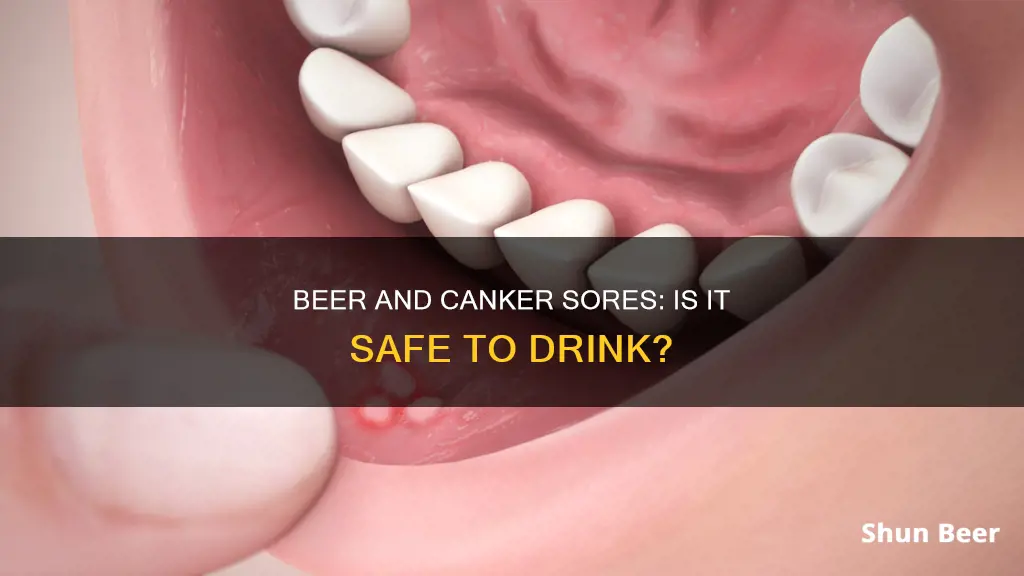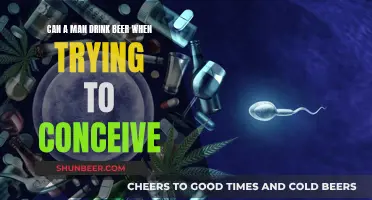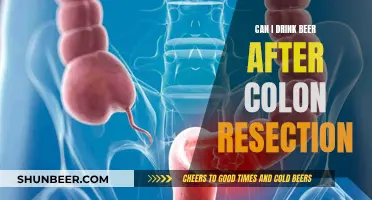
Canker sores, also known as mouth ulcers, are small, shallow lesions that develop on the soft tissues inside the mouth. They are characterised by a red border and a white or yellow centre, and can cause pain, making it difficult to talk and eat. While the exact cause of canker sores is unknown, they are believed to be triggered by factors such as physical irritation, spicy food, stress, nutritional deficiencies, and alcohol consumption. As such, it is important to consider the potential impact of drinking beer when dealing with a canker sore, as alcohol can contribute to the development of these sores by causing folic acid deficiency and drying out the mouth, making it more susceptible to infections.
What You'll Learn

Drinking beer with a canker sore can be painful
Alcoholic drinks such as beer can contribute to the development of canker sores. Alcohol can lead to folic acid deficiency, which can trigger these sores. Folic acid is a type of B vitamin that helps in the DNA repair process. Excessive alcohol intake interferes with folic acid absorption and increases folate excretion through urine, which may result in canker sores. In addition, alcohol dries out the mouth, leaving it more vulnerable to infections. Saliva prevents infection by controlling bacteria and fungi in the mouth, and alcohol, as a drying agent, decreases saliva production.
If you have a canker sore, drinking beer will likely irritate the sore and make it more painful. The beer will come into direct contact with the sore, and the carbonation and alcohol content can cause a stinging sensation. It is generally recommended to avoid alcoholic beverages and carbonated drinks when you have a canker sore.
To relieve the pain of a canker sore, you can try various home remedies such as eating soft, bland foods, drinking cold fluids, and using over-the-counter numbing medicines. It is also important to maintain proper oral hygiene by carefully brushing your teeth and rinsing with saltwater or a mild mouthwash.
While drinking beer with a canker sore is not dangerous, it can significantly increase the discomfort and irritation associated with the sore. It is advisable to avoid alcoholic beverages until the sore has healed.
Topsy Keurig Beer: Brewing Innovation Explained
You may want to see also

Beer may cause canker sores due to folic acid deficiency
Canker sores, also known as aphthous ulcers, are small, shallow ulcers that develop in the mouth. They are not contagious and are not caused by the herpes virus like cold sores. Canker sores are auto-immune, meaning your body is attacking itself.
There is much debate among doctors and dentists about what causes canker sores, and how alcohol plays a role. However, one explanation is that alcohol can lead to folic acid deficiency, which in turn can trigger canker sores. Folic acid, or folate, is a type of B vitamin that helps in the DNA repair process. By interfering with folic acid absorption and increasing folate excretion through urine, excessive alcohol intake may result in canker sores.
In general, people with nutritional deficiencies of folic acid, vitamin B12, and iron appear to develop canker sores more frequently. Therefore, it is recommended to eat foods rich in folic acid, such as leafy vegetables and legumes, to prevent canker sores. Additionally, drinking plenty of water before sleeping can help to combat the effects of alcohol, keeping the mouth moist, and reducing the chances of waking up with alcohol-induced canker sores.
While the relationship between alcohol consumption and canker sores is not fully understood, it is clear that alcohol can contribute to the development of these sores. Alcohol's drying effect on the mouth, coupled with its interference in folic acid absorption, can create an environment conducive to the formation of canker sores. Thus, it is advisable to limit alcohol intake and maintain a balanced diet to reduce the occurrence of these painful ulcers.
Beer Left Out: Is It Still Safe to Drink?
You may want to see also

Beer's drying effect may also cause canker sores
Beer and other alcoholic drinks can cause canker sores, also known as aphthous ulcers, in several ways. One of the main ways is by causing a folic acid deficiency, which can trigger canker sores. Folic acid, or folate, is a type of B vitamin that helps in the DNA repair process. By interfering with folic acid absorption and increasing folate excretion through urine, excessive alcohol intake may result in a mouthful of burdensome canker sores. People with nutritional deficiencies of folic acid, vitamin B12, and iron appear to develop canker sores more often.
Another way that beer can cause canker sores is by drying out the mouth. Saliva plays a crucial role in preventing infections by controlling bacteria and fungi in the mouth. Beer, like other alcoholic drinks, is a drying agent, dehydrating the body's cells and decreasing saliva production. This dry mouth environment may provide an opportunity for canker sores to arise.
In addition to causing folic acid deficiency and dry mouth, alcohol can also irritate the mucous membranes in the mouth, making it more susceptible to canker sores. Alcohol is acidic, and drinking it can contribute to or trigger mouth ulcers. This is especially true if the mouth is already irritated by crispy or hard foods, acidic, spicy, or salty foods, or fizzy drinks.
To prevent canker sores from developing or worsening due to alcohol consumption, it is recommended to drink plenty of water before going to sleep and eat foods high in folic acid. Maintaining proper oral hygiene and avoiding irritating oral hygiene products, such as mouthwashes containing alcohol or toothpaste with sodium lauryl sulfate, can also help.
Beer Traps: Effective Snail Control or Urban Myth?
You may want to see also

Drinking water and eating folic-acid rich foods may help prevent canker sores
Canker sores are small, shallow ulcers that appear inside the mouth. They are not contagious and are not caused by the herpes virus. Instead, they are autoimmune, which means that the body is attacking itself. Canker sores are painful and can make drinking, eating, and talking uncomfortable.
Drinking alcohol may contribute to the development of canker sores. Alcohol can lead to a folic acid deficiency, which can trigger these sores. Folic acid, or folate, is a type of B vitamin that is important for DNA repair. A deficiency in folic acid can be caused by excessive alcohol intake, as it interferes with folic acid absorption and increases folate excretion through urine. In addition, alcohol can dry out the mouth, leaving it more vulnerable to infections. Saliva helps to prevent infections by controlling bacteria and fungi in the mouth, and alcohol, as a drying agent, decreases saliva production.
To help prevent canker sores, it is recommended to drink plenty of water and eat foods rich in folic acid. Leafy green vegetables such as spinach, kale, and arugula are excellent sources of folate. Other vegetables like asparagus, beets, and Brussels sprouts are also high in folate. Legumes such as kidney beans, lentils, and chickpeas are another great way to boost your folate intake. Citrus fruits like oranges, grapefruit, lemons, and limes are delicious sources of folate as well. Additionally, eggs, avocados, nuts, seeds, and fortified grains can help ensure you are getting enough folic acid in your diet.
By staying hydrated and including folic-acid rich foods in your diet, you may be able to reduce your chances of developing canker sores.
Drinking Beer on Rhode Island's Beaches: What's Allowed?
You may want to see also

Canker sores are not contagious
Drinking alcohol can contribute to canker sores, also known as aphthous ulcers. These are small, shallow, and painful ulcers that appear inside the mouth, on the lips, cheeks, gums, and tongue. They are not contagious and cannot be spread through saliva.
Canker sores are not caused by an infection, but rather by an autoimmune response, where the body essentially attacks itself. They are not the result of a viral infection like cold sores, which are highly contagious and spread through close personal contact. Unlike cold sores, canker sores are not caused by the herpes virus.
Canker sores typically occur as a result of injury or trauma to the mouth, such as biting your cheek or tongue, or from dental work or braces. They can also be triggered by stress, poor immune health, a dry mouth, food allergies, and nutritional deficiencies of folic acid, vitamin B12, and iron. While alcohol consumption can lead to folic acid deficiency, it can also dry out the mouth, creating conditions that are favourable for canker sores to develop.
Canker sores usually heal on their own within one to three weeks, even without treatment. However, there are treatments available to help manage the pain and speed up the healing process, such as over-the-counter or prescription gels, ointments, and rinses.
Beer and Budesonide: Is It Safe to Mix?
You may want to see also
Frequently asked questions
It is not recommended to drink beer or any other alcoholic beverage when you have a canker sore as alcohol dries out the mouth, leaving it more vulnerable to infection.
To prevent canker sores, it is important to maintain a healthy oral microbiome. This can be done by using alcohol-free mouthwash, limiting alcohol consumption, and controlling stress.
It is best to avoid carbonated drinks, alcohol, and very hot drinks. Foods that are acidic, spicy, salty, or chocolatey will also irritate the sore.
To relieve pain, you can apply numbing medicine, use a pain reliever such as ibuprofen, or hold ice on the sore until it is numb.







